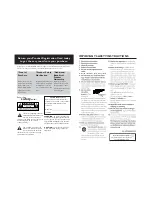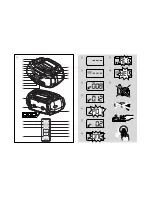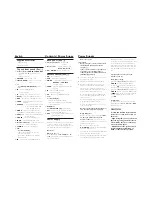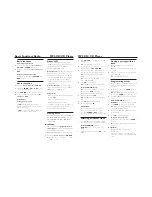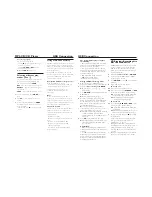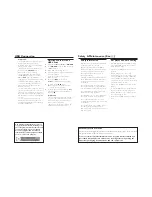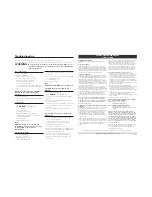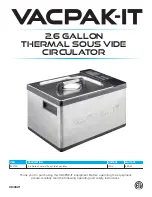
Safety information
•
Place the set on a hard, flat and stable surface
so that the system does not tilt.
•
Do not expose the set, batteries, CDs to
humidity, rain, sand or excessive heat caused
by heating equipment or direct sunlight.
•
The apparatus shall not be exposed to
dripping or splashing.
•
Adequate ventilation with a minimum gap of
15 cm between the ventilation holes and sur-
rounding surfaces is necessary to prevent
heat build-up.
•
The ventilation should not be impeded by
covering the ventilation openings with items,
such as newspapers, table-cloths, curtains, etc..
•
No objects filled with liquids, such as vases,
shall be placed on the apparatus.
•
No naked flame sources, such as lighted can-
dles, should be placed on the apparatus.
•
The mechanical parts of the set contain
self-lubricating bearings and must not be oiled
or lubricated.
•
To clean the set, use a dry cloth. Do not use
any cleaning agents containing alcohol,
ammonia, benzene or abrasives as these may
harm the housing.
CD player and CD handling
•
If the CD player cannot read CDs correctly,
use a cleaning CD to clean the lens before
taking the set to repair.
•
The lens of the CD player should never be
touched!
•
Sudden changes in the surrounding
temperature can cause condensation on the
lens of your CD player. Playing a CD is then
not possible. Do not attempt to clean the
lens but leave the set in a warm environment
until the moisture evaporates.
•
Always close the CD door to avoid dust on
the lens.
•
To clean the CD, wipe in a straight line from
the center towards the edge using a soft,
lint-free cloth. Do not use cleaning agents as
they may damage the disc.
•
Never write on a CD or attach any stickers
to it.
Safety & Maintenance (See
!
)
USB Connection
Helpful hints:
– In recording mode (even the USB device is
unplugged from the set), selections of
track/album, play modes (repeat and shuffle
modes) are not available.
– All the recorded audio files will be stored in
the folder named
_PHILIPS
which is
automatically created for recording.
– The recorded audio file will be stored in
either
.mp3
format (for the disc of audio or
MP3), or
.wma
format (for WMA disc).
– Copyright-protected CD will not be recorded.
– DRM-protected WMA is not supported.
– Do not directly unplug the USB device to
stop recording for a possible loss of some of
the recorded contents.
– For MP3 and WMA recording, if the name of
a file to be recorded is the same as the one of
a file stored in the USB device, the file will not
be recorded. In this case, AZ1835’s display will
show flashing
Err
and
duP
interchangeably
3 seconds.
– For some USB device of low speed, the
playback may go with muted sound for some
seconds which will depend on the capability of
the low-speed USB device.
Deleting audio files on a
USB device
1
Adjust the
source selector
to
CD/USB
.
2
Press
CD/USB
to enter USB mode if USB
is NOT displayed.
3
Plug a USB mass storage device.
4
Select the track you want to delete before
or during playback.
•
In the stop position, you may select an
album to delete.
5
Briefly press
DEL
on the remote.
➜
“
DEL
” is displayed, flashing (see
0
).
6
To delete it, press
DEL
again.
➜
The playback of the USB device will
come to the stop position.
7
To not to delete, wait until flashing “
DEL
”
disappears after 4 seconds of flashing, or
just press
9
.
Helpful hints:
– For some MP3 players, AZ1835 will read it
as only one folder which will wrap up all the
audio files on the player regardless of more
than one folder on that player.
– AZ1835 may not be able to delete a file
/albume stored on some MP3 players.
Environmental information
All unnecessary packaging material has been omitted.The packaging can be easily separated
into three materials: cardboard, polystyrene and plastic.
Your set consists of materials which can be recycled if disassembled by a
specialized company. Please observe the local regulations regarding the
disposal of packaging, dead batteries and old equipment.
The making of unauthorized copies of
copy-protected material, including com-
puter programmes, files, broadcasts and
sound recordings, may be an infringe-
ment of copyrights and constitute a
criminal offence.This equipment should
not be used for such purposes.


